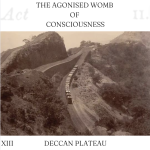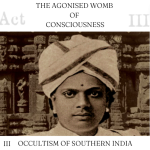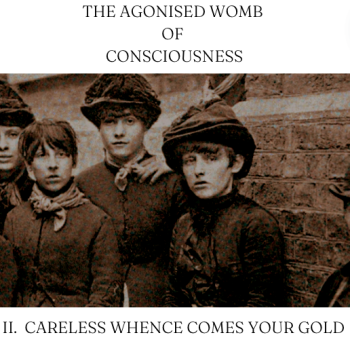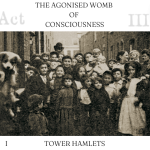TOWER HAMLETS
ACT III.
I.
⸻
“I am speaking nearly every night,” said Besant. “It is an immense district, going right down as far as the Isle of Dogs, and including by the whole of Whitechapel. It is hard work covering the whole constituency. I am not canvassing myself, but my committee are canvassing, and also my match-girls, of whose voluntary help I am very proud. I am confining myself to public speaking.”
Annie Besant, one of the few women standing for election during the present contest, issued the most advanced program before the electors of London in the pending School Board election. She was the only candidate in the Tower Hamlets (a division comprising 60,000 electors,) who was selected by the joint committees of the Liberal and Radical Federations. For the five seats in the Tower Hamlets, there were eight genuine candidates in the field (the other three, having not issued any address that was visible to the outside world, were more or less bogus.) The Church was running three, the Non-Conformists two; Sir Edmund Currie stood by himself on an independent footing, and Colonel Lenox Prendergast was the Catholic candidate.[1] Independent of all of them was Besant. Others who were campaigning on similar platforms dropped out of the running to “make her election beyond doubt.”)
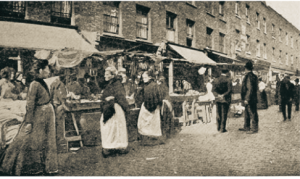
White Chapel.[2]
Besant delivered an hour-long address a week before to large audience in the Stepney Meeting House, where she placed her views before the audience. Besant asked the electors of Stepney to return her as a member of the School Board of London, seeing that for many years past she had championed the cause of the workers. Fifteen years earlier she had cut herself adrift from the middle class of society in which she was born, in order to co-operate with the “sons and daughters of toil.” Her sympathies were with the people, and, if returned as a member of the Board, she would advocate a “thoroughly sound education being given to each child, not with the object of throwing upon the labor market half-trained inefficient lads at starvation wages,” rather she would have “each boy and girl thoroughly and fully instructed, mentally and technically, in order to fit them to become useful members of society.” She was in favor of “free meals, abolition of fees, continuation schools, evening meetings of the board, the use of the schools for public meetings, and economy of management.”[3] She was cheered loudly when she returned to her seat, but there were many who found Besant’s views deeply troubling. Her latest work, The Law of Population, was causing a stir among a certain class of people, as it was a “work designed to induce married people to limit their family within means of subsistence.”[4]
W.T. Stead, editor of the Pall Mall Gazette, offered assistance to his friend by conducting an interview with Besant at her office (the office of the Link) at 34 Bouverie Street. He found her up to her eyes in proof-sheets and other papers connected with the late International Congress. He was pleased to see that she was looking very well (considering that she is in the midst of a contested election,) and in better spirits than she had been for some time.
“How are your meetings attended?” asked Stead.
“They are crowded. If public meetings were any test, which, unfortunately, they seldom are, there would be no doubt about my return. Nothing could be better than the attendance and enthusiasm of my meetings. They tell me they are much the best attended of those of any of the candidates—but that, of course, is probably due to the fact that I am better known as a speaker than any of my opponents.”
“How do you find your program received?
“With greatest enthusiasm. I have very little opposition, and the most popular planks off my platform, are free education and free meals. Free education is very popular both with people who would benefit by it and with the teachers, whose time is wasted by filling in the multiplicity of papers—the whole of Friday afternoon, I am told, is often consumed by filling up the returns for the Board, most of which would be unnecessary if education were free. The whole additional cost that would be entailed by abolishing fees would be one-fourth of the expense of our present education, and against this increase there will be a great many set-offs in the shape of diminished costs of prosecution, increased attendance, and saving of time and labor.”
“The ratepayers do not object?”
“So far, I have not found any objection. I am always careful to explain that I think the rates are high enough already, and I would propose to increase the rates by one penny, either for free education or for free meals. For the cost of the free meals I should go to the City Companies and the cost of free education I would defray by a special rate on ground landlords—two propositions which are always received with great cordiality by my hearers. Of course, all that we can do it to organize the free voluntary meal. For we have no power under the Act of Parliament to provide free meals for scholars.”
“I think you object to payment by results?”
“No, I do not—I object to our present system of payment by results—which is a very different thing. I incline more to the Continental system of making grants, subject to the careful and intelligent periodical examination of the school by inspectors. The system is described by Matthew Arnold in his ‘Essays on Education.’”
“Is your Socialism a disadvantage in the contest?”
“No; on the whole, not; while it may excite some opposition it generates more enthusiasm, and the active Socialists are working for me with untiring energy.”
“Is your sex a disadvantage?”
“Rather the contrary. There are too few women in the School Board, and it is generally felt among the electors that there should be more women on the Board than we are.”
“What, then, is chiefly used against you?”
“Chiefly my secularism. I do not believe that religion should be taught in the school—neither do I believe that the Bible should be read as a book. It can hardly be read without being explained, and if you allow explanations, you open the door for the inclusion of innumerable religious, or anti-religious, views by the teacher.”
“You do not agree, then, with Professor Huxley, who was in favor of reading the Bible as an English classic?”
“No, I do not—and I think if I were a Christian I should strongly object to treating the Bible in such fashion.”
“As this objection much hold on the constituency?”
“Not so far as I can see. I am told the Church party are mediating the launching of a manifesto against me, but it does not very much matter; if it intensifies the hostility of those who are opposed to me, it will increase the enthusiasm of those who are already on my side. The Christian Evidence people have been down moving amendments at my meetings, but they have only on one occasion carried with them a very small and miserable minority of my audience. The other day in Victoria Park. I was accused of having advocated criminal practices as a remedy for over-population. Mr. Burrows went down, challenged my accuser to substantiate his allegations, and read from my writing a passage strongly condemnatory of the practices imputed to me; whereupon the meeting passed an emphatic resolution denouncing my assailant as a slanderer, and then ‘went’ for his platform, from which he disappeared suddenly, and, let us hope, forever.”

View in Spitalfields.[5]
“What will be the cost of the election per candidate?”
“It may be anything you like to make it. We are distributing 70,000 of these handbills, and my address, from house to house. We have not paid workers at all, my only expense being the hire of halls and committee rooms, and the printing and posting of bills. Altogether I do not think my expenses will amount £60, or about £1 per 1,000 of electors, and this is being met by subscriptions. I do not think the contest will be allowed to cost me a penny.”
“Is there a very keen interest in the contest?”
“Not very; at the last election only one out of every five electors voted.”
“You are appealing for ‘plumbers,’ I see. Will you be able to secure much Irish support?”
“Some—Colonel Prendergrast is a strong Coercionist, and the Irish are revolting exceedingly against him on that ground. He tries to counteract it by invoking religion as against our political cry, urges that I am against religion.”
“One word more. Have you formed any idea as to the amount of money that will be required to give a free meal to all the children in the Board schools?”
“No, not yet—the realization of that ideal is not sufficiently close at hand to demand such calculation in detail. We are contending for the principle, and the principle is accepted almost everywhere, subject to the proviso that the cost of the meals shall not be provided out of the ratepayers, as the people are heavily enough rated already.”[6]
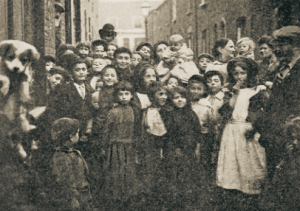
A Group of Children in Tower Hamlets.[7]
← →
THE AGONIZED WOMB OF CONSCIOUSNESS SECTIONS: “ACT III”
I. TOWER HAMLETS.
SOURCES:
[1] Booth, Charles. “The Inhabitants of Tower Hamlets (School Board Division,) Their Condition and Occupations.” The Journal of the Royal Statistical Society. Vol. L, No. 2 (1887): 326–401.
[2] London, Jack. The People of the Abyss. The Macmillan Company. London, England. (1903): 223.
[3] “Mrs. Annie Besant at Stepney.” The Eastern Post. (London, England) November 10, 1888.
[4] “Publisher’s Notices.” The Leeds Times. (Yorkshire, England) November 17, 1888.
[5] London, Jack. The People of the Abyss. The Macmillan Company. London, England. (1903): 224.
[6] “For Free School and Free Meals.” The Pall Mall Gazette. (London, England) November 19, 1888.
[7] London, Jack. The People of the Abyss. The Macmillan Company. London, England. (1903): 220.


